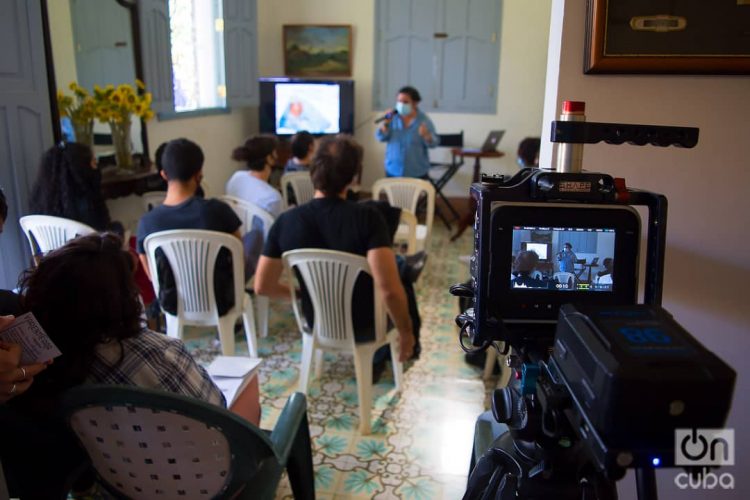Varentierra: it is said in Cuba of a rustic construction made from the royal palm, typical of rural areas, with one room, a gabled roof that reaches the ground and only a front wall with its door, used by farmers to store provisions, materials, farming tools and even their crops, and also as a shelter during storms and cyclones.
But for Cuban cinema, since this weekend―or actually a little before, since its call was launched in early November―Varentierra is much more. It is a network still in the making of audiovisual support and collaboration, but already with its first and promising results, in which independent producers and state entities, young filmmakers and renowned figures of the seventh art converge, and whose main organizer and promoter is, not coincidentally, WajirosFilms.
Guajiro: it is said in Cuba of the farmer, of the rural man and woman. But if instead of “G” it is written with “W,” then its meaning expands to other dimensions within the extensive universe of Cuban audiovisuals.
“At Wajiros we defend the traditional, but from the contemporary, that’s the reason for the ‘W’,” explains to OnCuba Carlos Gómez, director and journalist, leader of this audiovisual group, legally legitimized thanks to the recent Decree-Law 373 of the independent creator, which already has an important work despite its having only three years of creation as a project. Added to this is the fact that in its genesis is the concept of a Cuba that far exceeds the cosmopolitan borders of Havana; that most of its members, although they now reside in the capital, come from other provinces.
This is why, Carlos affirms, WajirosFilms is interested in showing in its work “a vision of the island that is not just that of Havana.”
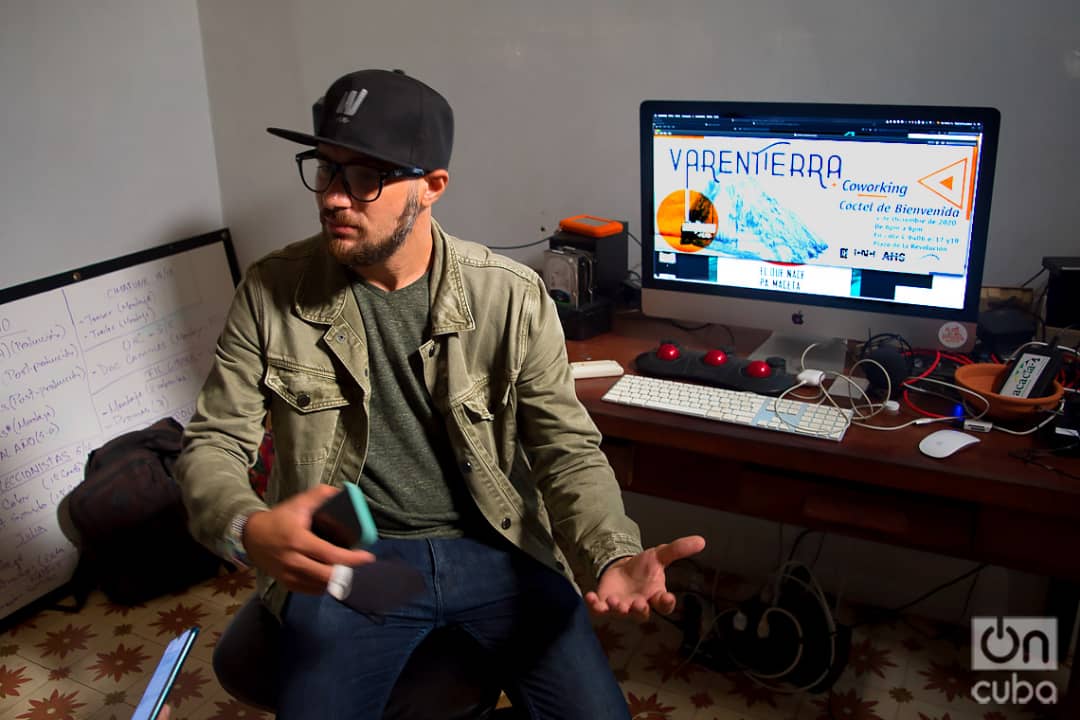
“Our dream is that in Cuba films can be made throughout the country, that new filmmakers have the visibility and opportunities they deserve, even from outside the capital, and that there are access mechanisms for them. That is why we created Varentierra. We realized that currently there is a lack of spaces for training, for exchange and for the strengthening of the projects of these filmmakers, particularly those from other provinces. So we decided to make a first call, a first selection and spend two days exchanging with them, debating their works, giving them lectures and consultancies,” he explains.
Those two days were on December 4 and 5, when the first audiovisual Varentierra coworking meeting was held at the WajirosFilms headquarters, on Calle C in El Vedado in Havana, in the context of the International New Latin American Film Festival. The creators of the 11 selected projects arrived there―from about 40 that answered the call, both in documentary and fiction―many of them born outside the capital, and also specialists such as Tania Delgado, Daniel Alemán, Claudia Calviño and Mayte Madruga, among others in charge of the theoretical sessions and workshops, and luxury advisers such as director Fernando Pérez, director of photography Raúl Pérez Ureta, actor Luis Alberto García and screenwriter Amílcar Salatti. And even gastronomic ventures and musicians like Frank Delgado and the duo Iris.
And although Wajiros took was responsible for a large part of the organization and financing of the meeting―taken from its income as an audiovisual producer―, it did not do it alone.
“We are not interested in separating,” insists Carlos, “we are interested in uniting. That is why we other independent production companies have joined the project as well as state institutions such as ICAIC, the Hermanos Saíz Association and entities such as the Santiago de Cuba Fundación Caguayo. Our intention is to work among all those who want to join, not to monopolize or produce all these projects―although if any of the selected filmmakers wanted to work with us, of course we would love it―, but to create synergies, working relationships, jointly supporting the projects for them to take shape.”
A network for and throughout Cuba
More than a two-day event, according to the leader of WajirosFilms, Varentierra is a project “that we want to sustain over time, an audiovisual collaboration network that lasts a whole year, coordinated by us, to encourage meetings, the exchange of materials and provide monitoring for the projects, not only of those that were selected by the jury, but even all those who answered the call. Our idea,” he notes, “is that, for example, in March, in the second part of the International New Latin American Film Festival and with the sponsorship of the festival itself, these projects that were now here, already have a meeting with great producers of Latin American cinema or worldwide who are interested in giving their support or money to materialize these works.”
“The network intends to bring together a group of young people throughout the country who want to make audiovisuals and continue learning how to increasingly make them better,” says Manuel Alejandro Rodríguez, a member of the WajirosFilms team, and one of the coordinators of the Varentierra network together with art historian Diana Moreno.
“We are very interested not only in working from the capital, but also in reaching young people in their own territories, in eastern Cuba, in the center, bringing them together there, fostering exchange there, with its peculiarities and possibilities; that’s something we have in our plans,” adds Manuel. “Because Havana should not continue to be the only audiovisual epicenter that exists today in the country. Why not change that dynamic and try to film in other territories and empower artists, filmmakers, technicians from the most diverse specialties, including many who today have an undoubted lack outside the capital, so that they gain experience and do their work from their own territories and make them with the best quality?”
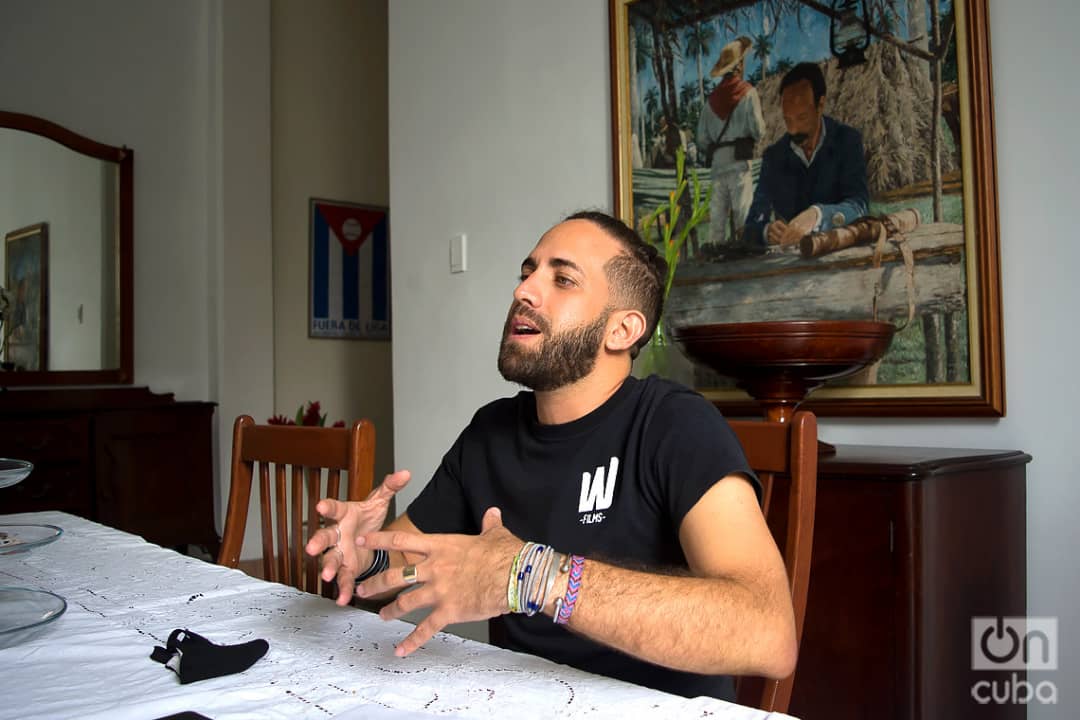
The also graduate of the San Antonio de los Baños International School of Film and Television (EICTV), explains that WajirosFilms has already had experiences “with workshops that we have carried out in various parts of the country, for example in Gibara, during the International Low-Budget Film Festival, in particular with adolescents and young people. There they have been given theoretical and practical tools to develop their projects, something that they have greatly appreciated.”
“And what happened now during these days of audiovisual coworking shows us that spaces like this are needed; that, although young filmmakers study at the ISA or elsewhere, and have prior training, they still need to learn, to find help to develop the projects they have in mind. Contributing to the materialization of that is a pleasure for us and also a duty, because those of us who went through the same experiences know that if we had not had people to help us when we were starting, or without the opportunity to participate in events such as the Youth Exhibit―whose future is sadly a mystery today―or the Almacén de la Imagen in Camagüey, or the Cámara Azul of the Romerías de Mayo, perhaps we would not have been able to exchange and learn from important film professionals and have access to materials for our artistic and professional growth. Varentierra then tries to pay back that support that at some point we also got.”
“A timely opened window”
Luis Alberto García does not need an introduction in Cuba. His extensive and recognized work in film and television on the island, and also outside of it, give him more than enough credentials to respect his opinion on any fact or aspect of the audiovisual universe. And his opinion about Varentierra is that it is, above all, about “a timely opened window.” He says it, yes, based on his professional experience and also with the merit it gives him to feel part, as an advisor to WajirosFilms, of what happened in these days and his future plans. Even to build his own definition.
“Wajiros does not mean that we only admit guajiros,” he explains to OnCuba. “For us, Wajiros is a way of life, an opportunity for those who are not in the mainstream, who do not belong to ICAIC or the ICRT, who are on the institutional periphery, who sometimes aren’t even independent creators, but are aspiring to be, to make their first work. And Varentierra tries, precisely, to give visibility to their work, to projects that have the quality to grow and be carried out and that are often lost due to lack of support and remain in the drawer of the person who created them.”
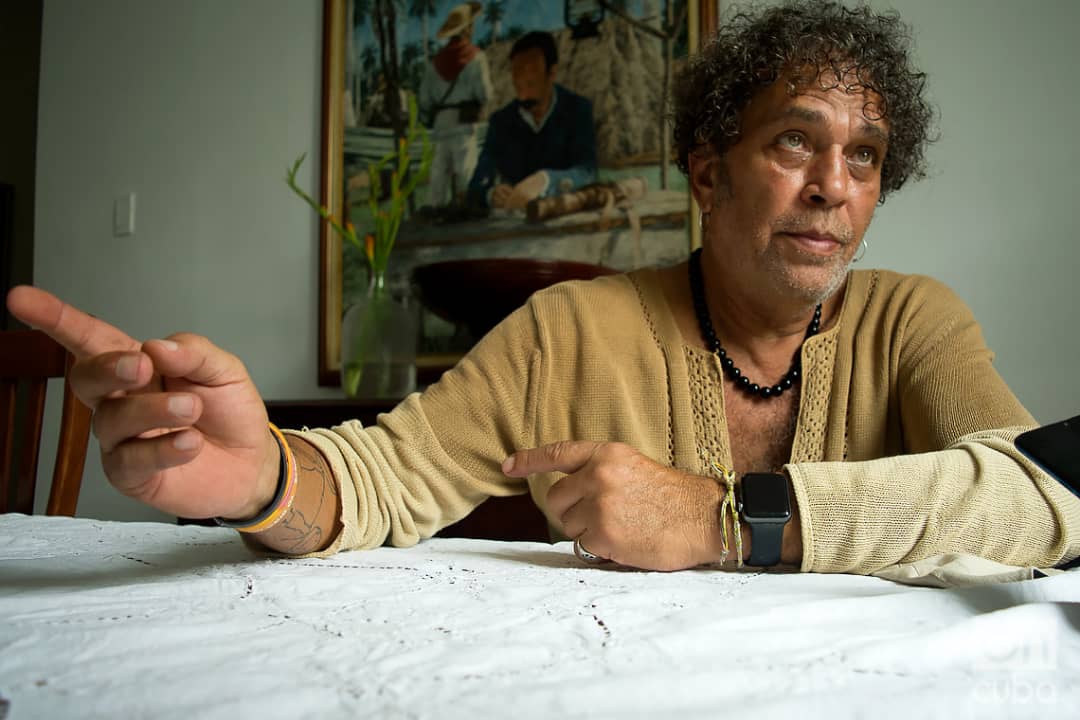
“That something like this happens seems wonderful to me, because it allows the filmmakers, young and not so young, who are in their province, who have a more difficult time because they live outside the capital, to get to know each other, get together, debate, share with people in the sphere, to be advised by really great people. Imagine that you were starting your first project and you had the opportunity to sit down and talk about that project with Fernando Pérez or Rául Pérez Ureta, who are two masters of Cuban cinema, and they tell you what they think of your work, what seems good to them, what you can improve, that they give you their advice and suggestions to find the best way to put what you have in your head on screen. That is wonderful, an opportunity that we believe can be useful and good for all those who have had the chance to be here.
“We certainly do not give them money,” says the protagonist of anthological films such as Clandestinos and La vida es silbar, and who participated in the audiovisual coworking as an adviser in the direction of actors, “we do not have money, but we are giving them moral support by telling them that their project is worthwhile, that it has quality and they should continue working on it; in addition, we offer lectures and workshops on diverse and important topics for making films, from copyright to editing, which are things that some may master, but others do not, because they are starting now. It is true that cinema is expensive and cheerful, but sometimes great works can be made without huge budgets, if you have the necessary knowledge and support.”
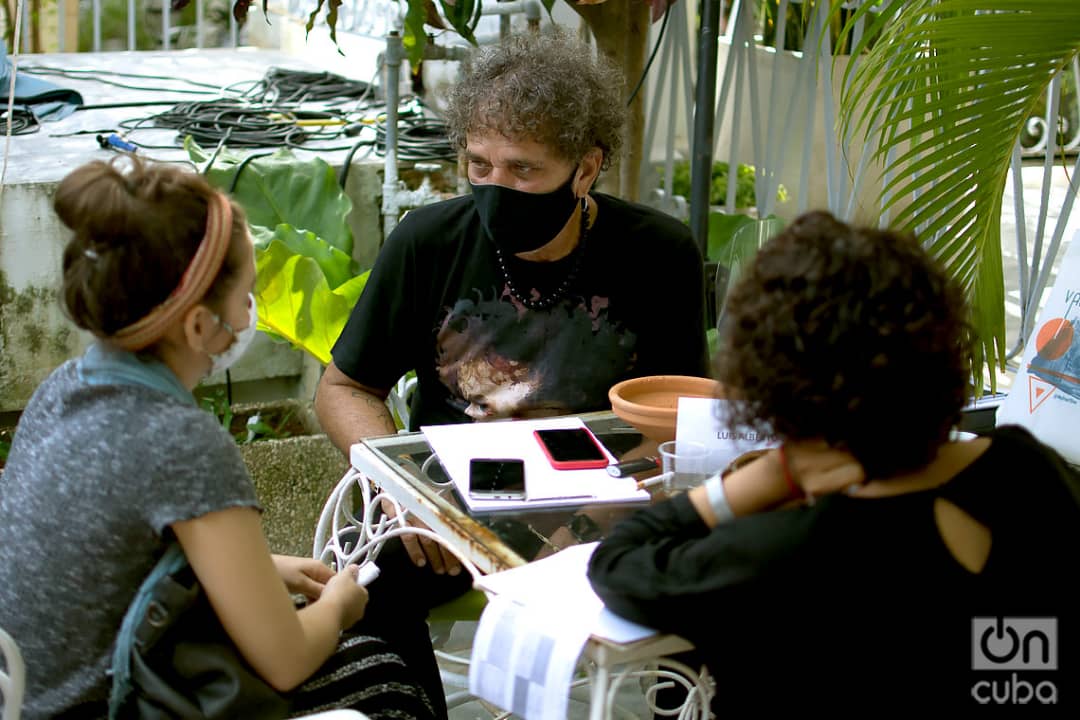
“Our idea is to give these young people training, knowledge; that they know how this world of cinema works, not only in Cuba, but in the real world, give them a theoretical and even practical body, which is something we have in mind, so that they know how to defend their projects, how to put them into practice, how to finish them, how to sell them, how to promote them, how to open doors, and how to prepare the next project as well. And the important thing is that it does not end here, in this meeting in Havana, but that we are going to follow up on it. And we are doing it, or at least that is what I myself also believe, because we must trust young people, in the audiovisual they are doing, in which there are already great works, and in the others that will come, and we have no choice but to allow that eclosion of talent to take place. It is something for the good of Cuban cinema and we are betting on that,” concluded the also protagonist of the liked saga of Nicanor O’Donnell.
An example of this commitment by Varentierra is Anabel Ramírez Hidalgo, a young woman from Holguin who presented to the WajirosFilms call the fiction feature film project Miedo o restos de fe, her first as a producer and the first by her fellow countryman Jimmy Ochoa as director. For her, the possibility of participating in this audiovisual coworking “has been really great.”
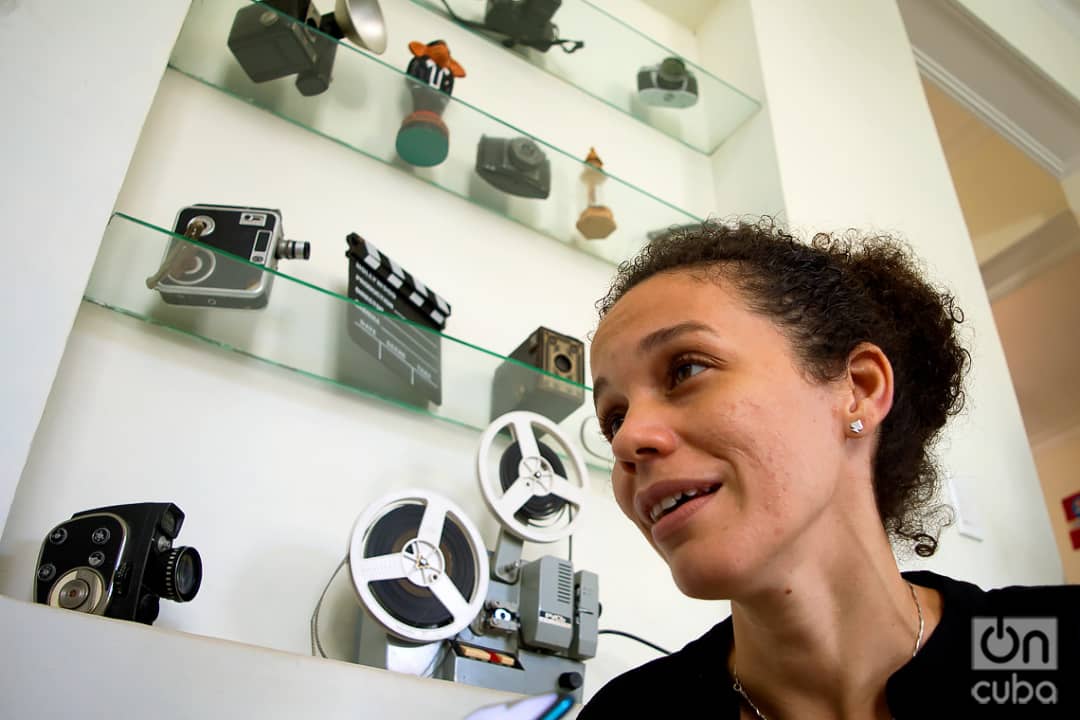
“It has been a space that has enhanced creativity, exchange, which has allowed us very enriching advice, not only formally and theoretically, but also humanly, which is fundamental in artistic projects,” she said to OnCuba. “And for our project in particular it has been very valuable because it has allowed us to analyze what at some point we saw as a weakness, find a way to turn it into a strength, seek partnerships that can help us carry out the project, which is currently in the development phase, and at this moment everything that contributes and enriches and solidifies the project is important and well received.”
Anabel confirms that “it is very difficult to make films in Holguín, not only because of the issue of financing, which is hard even in Havana, but because there it is also more difficult to have access to spaces like this, to share with specialists, with people already consecrated in the cinema, who can advise you, who can guide you, especially when, as in our case, it is our first feature film, and those criteria help us to overcome our inexperience, to improve and move on.”
On the other side
However, Varentierra’s experience is not only valued positively by those who this weekend received a wide arsenal of knowledge and opinions about their works, but also by those who were on the other side, in front of the group, giving the workshops, advising projects. They have also gained from the debate and feedback from young people about what they have experienced and a point in favor of the network born now.
“I think this initiative is excellent, because it is a space that contributes to leveling the knowledge, information and tools necessary to make films, and particularly helps the youngest,” says Claudia Calviño, a young but already recognized producer who has to her credit titles such as Juan de los Muertos, Santa y Andrés, Yuli and El viaje extraordinario de Celeste García, and who was in charge of one of the workshops of the event.
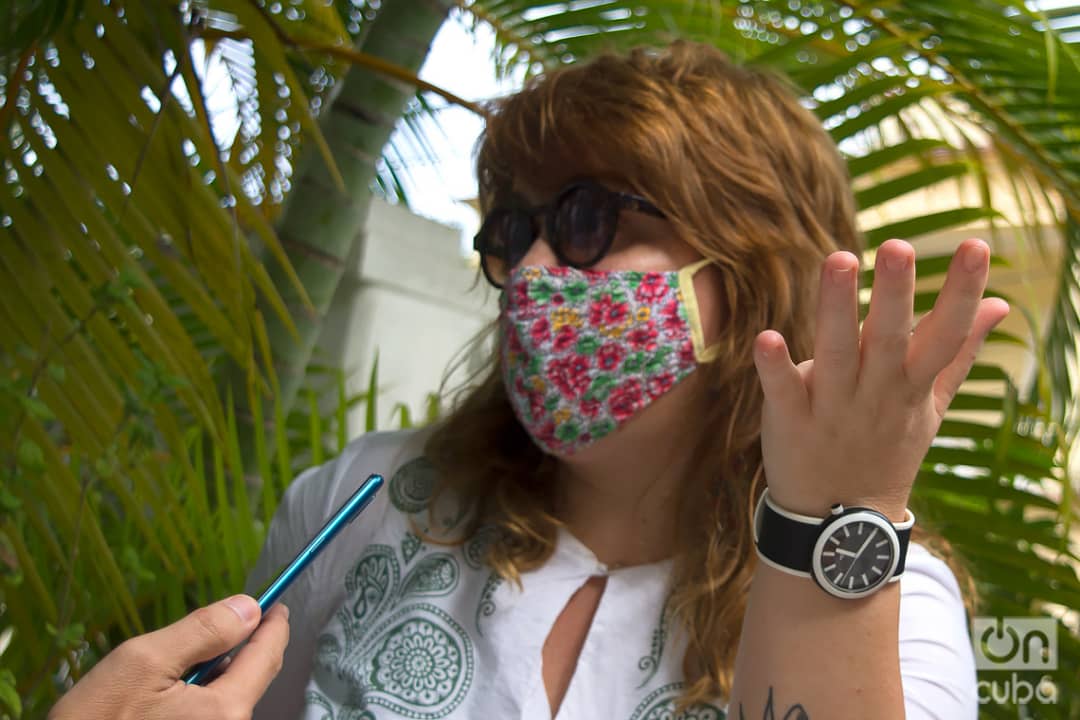
“Spaces like this one seem very interesting to me because they not only confront you with other filmmakers who are in similar processes to yours, but they also help you obtain tools that are basic, essential, to be able to not only film but carry out your audiovisual project with all that that implies,” she comments to OnCuba. “And it is important that everyone can have access to these tools so that the competition is then about the creative, the potential, the artistic quality of a work and its real economic possibilities, and not about the fact that I know how to make a portfolio better than you or how to make a better budget, which are specific tools and should not define the quality of a project.
“In addition, for me being in this type of event is very important, because as a producer I am interested in knowing what good projects are emerging, which ones are being developed, and it is a privilege because it not only allows me to transmit my knowledge to the young participants, which is something that other people can do, but also meet new producers, new directors, new scriptwriters, listen to them, get to know their ideas, which I also like and has to do directly with my work because it allows me to know where the new talent is.”
Like Claudia, maestro Fernando Pérez was also extremely pleased to participate and exchange with new filmmakers from all over the island.
“The possibility of interacting with young people keeps me alive,” the director of classics like Madagascar and Suite Habana assures us, “because throughout life one can have the tendency to stay with what one knows, with what one has learned, but for me life is always change, it is evolution, it is facing new questions without the answers even being at hand. That is why the exchange with young people has always enriched me, it has always motivated me to discover things that maybe I was not thinking and that they do think and say, and that is something I always look for. I may be there initially to convey my experience to them, but I am also there to receive from them, to learn from their ideas, their points of view and, above all, their audacity.”
But beyond that interaction, the National Film Award winner also acknowledged feeling “positively surprised” by what he saw and discovered from the very organization and intentions of Varentierra, already more than a meeting, a network that, like its architectural reference, seeks to safeguard the necessary tools to do, in this case cinema, and protect those who take shelter in it from any storm that looms on the horizon, in Wajiros code.
“The event positively surprised me, it energized me not only because of the exchange with young people but also because its organization is part of an independent production company, and that is unprecedented in Cuba and extremely encouraging,” said Fernando. “Generally, one would believe that each production company would focus on their own projects, but that WajirosFilms thinks not only about their own work, but also about promoting, helping, seeing to projects that they are not necessarily developing, really moved me. And that is why I responded to its call, because it seems very positive to me, something that speaks very well of those young people who are making Cuban cinema today and also contributing to that of tomorrow.”

